When a criminal mastermind, a bookie and a lawyer join forces, assembling a crack team to pull off a lucrative jewellery heist, the expectation is that the robbery be awarded the most screen time. John Huston's "The Asphalt Jungle" places more emphasis on preparation and downfall as much as it does the actual caper, and it is a decision that pays off splendidly. Depicting the minutiae of the plan from the perspective of the criminals and compounding naturalism and expressionism to achieve the distinctive aesthetic and correlative content of film noir, "The Asphalt Jungle" is an anatomy of crime that never glamorises its subject. Nothing is over-dramatic or extraneous, every shot meticulously designed, expertly framed and diffidently lit in a sustained manner, matching its unassuming Midwest backdrop. One such member of the new criminal enterprise, Sterling Hayden's hulking hoodlum with penchant for horses, is galvanised and haunted by the loss of his childhood home, a ranch representing innocence and simplicity. It is this pulverising toxicity of pathos, ulterior motives and individual vices that inevitably leads to the criminal collective's rapid ruination. Huston's gang of deviants are world-weary and invariably inspire empathy for their tragic flaws dooming them to fail, but that isn't to say they are entirely humanised. Louis Calhern's duplicitous lawyer is broke from funding the lavish lifestyles of his bed-ridden wife and young mistress, inducing his desire to fleece the loot for himself, a plot that generates police suspicion, murder and suicide. He is not the only loose cog in the machine, though, as the initial plan was not exactly foolproof to begin with, and as Huston showcases in the robbery scene, all 11 minutes of it, that even criminal masterminds cannot account for every contingency. If the heist had gone ahead without a hitch, it would have fallen apart in the aftermath; not being able to spend any of the money immediately, and paranoia sets in amongst the weaker, less experienced members, causing dissension and betrayal.
Huston presents the audience with a set of criminals who are deeply flawed and far less capable of pulling off a heist than we anticipate them to be, and that is to its advantage since we identify with its characters and their infallibility. Later films concentrating on heists were too implausible, suggesting that cons could be trusted. Huston's film does not sanitise or expurgate any of its disagreeable content, and such unsavoury actions are shown in all their unpleasant glory. It is conversely grim and mesmerising. An enduring classic of the crime genre that is inherently watchable in spite of its pessimistic tone and bleak ending.
All reviews -
Movies (55)
The Asphalt Jungle review
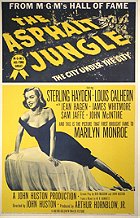 Posted : 4 years, 11 months ago on 16 June 2020 06:01
(A review of The Asphalt Jungle)
Posted : 4 years, 11 months ago on 16 June 2020 06:01
(A review of The Asphalt Jungle) 0 comments, Reply to this entry
0 comments, Reply to this entry
Sweet Smell of Success review
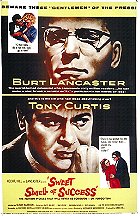 Posted : 4 years, 11 months ago on 16 June 2020 08:02
(A review of Sweet Smell of Success)
Posted : 4 years, 11 months ago on 16 June 2020 08:02
(A review of Sweet Smell of Success)Lurid, sleazy and venal, "Sweet Smell of Success" fits the criteria for film noir and then some. Journalism is the source of shady dealings and machinations here, with not a single character within that field shown as being either worthy of praise or beyond reproach. Alexander Mackendrick unveils the New York press elite without averting from their reprehensibility, ensuring that his film pervades cynicism and sardonicism, with every frame exuding rancour, vitriol and scorn for the characters and their indefensible actions. Mackendrick presents us with repellent characters and situations without gangsters, molls or murders, and heightened considerably by James Wong Howe's superbly off-kilter cinematography, this conversion of antediluvian noir themes in a dramatic context yields results. "Sweet Smell of Success" utilises its Times Square setting magnificently, capturing the impure, corrupt atmosphere to the point it becomes a character in itself. It is a film that feels contaminated by its own scenery, and such intensity and acridity is also felt in the potent delivery of the concussive, grammatical dialogue. Each spoken word boasts a battering aural impact, the sharp wit, inflexions and whip-smart literacy of the film's verbal exchanges are as pungent and vital as its big city backdrop.
Despite its failure at the box-office due to fans of Tony Curtis recoiling at the sight of their idol playing a scheming "cookie full of arsenic", "Sweet Smell of Success" went on to be recognised as an indubitable classic of post-war American cinema, perfectly epitomising the slimy side of Manhattan. At its core, the thrilling tug-of-war between an upstart press agent and the bullying columnist he relies on for publicity has the feel of a tautly plotted power play cut from the Broadway cloth, but the apropos jazz-heavy score, contorted camera angles and shadowy aesthetic combine to create a dramatic energy dependent on relationships and tension to appear more cinematic and expansive. From the hysteria of the sidewalks and its scabrous, satirical complexity, "Sweet Smell of Success" revels in its own bleakness and cruelty whilst registering as utterly engaging and immersive.
Despite its failure at the box-office due to fans of Tony Curtis recoiling at the sight of their idol playing a scheming "cookie full of arsenic", "Sweet Smell of Success" went on to be recognised as an indubitable classic of post-war American cinema, perfectly epitomising the slimy side of Manhattan. At its core, the thrilling tug-of-war between an upstart press agent and the bullying columnist he relies on for publicity has the feel of a tautly plotted power play cut from the Broadway cloth, but the apropos jazz-heavy score, contorted camera angles and shadowy aesthetic combine to create a dramatic energy dependent on relationships and tension to appear more cinematic and expansive. From the hysteria of the sidewalks and its scabrous, satirical complexity, "Sweet Smell of Success" revels in its own bleakness and cruelty whilst registering as utterly engaging and immersive.
 0 comments, Reply to this entry
0 comments, Reply to this entry
Double Indemnity review
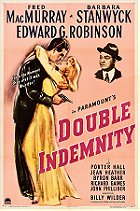 Posted : 4 years, 11 months ago on 15 June 2020 09:03
(A review of Double Indemnity )
Posted : 4 years, 11 months ago on 15 June 2020 09:03
(A review of Double Indemnity )Generally considered the prototypical film noir, establishing many of the genre's codes and conventions, as well as its stylistic form, "Double Indemnity" also promulgated its writer-director Billy Wilder's ascension to greatness, securing his newfound position as one of the Hollywood elite practically overnight. It is a rough diamond: hard-edged, sombre and sly, riveting and suspenseful from the outset and despite its downbeat, cynical streak, laden with mirth, but Hollywood relished this darker content with delight. Wilder tapped into the consciousness of the public, honing in on their innermost desires, anxieties and fantasies before projecting them onto the screen and crafting exceptional quality cinema.
Wilder would retain his forte for well-written dialogue, but here it dazzles and revels in its own hardboiled sharpness. Flirtation, flippancy and deceit drip from the waxy pout of the Machiavellian, surly and brash Barbara Stanwyck, whose bad wig and dangerously seductive anklet compound the film's richly detailed tapestry of shady scams, sleaze and insincerity. Stanwyck's iconic portrayal of Phyllis Dietrichson is the ultimate depiction of the phony femme fatale; Wilder assures us that she lures, corrupts and manipulates the gullible Fred MacMurray's insurance salesman Walter Neff to his downfall, and we witness said duplicity unfold in spectacular fashion. However, it should be noted that Neff's transgressions are not linked to a foul, unscrupulous temptress who takes advantage of his male pliability and weakness when faced with sexual desire, although these traits are to his detriment. Wilder's examination of a law-abiding man's descent into criminality is perversely unconcerned with how unsavoury aspects of his supposedly good nature actually are, especially when one considers that he acquiesces then essentially devises the cunning scheme owing to his knowledge of the titular policy and commits the actual murder. He just doesn't bet on his co-worker becoming his investigator and uncovering all of his heinous actions, and incidentally, that curious relationship, i.e. a platonic love being expressed between two men within an emotional context, is particularly radical for the time period, and goes some way to redeeming the film in terms of obsolescence.
An acidic, intoxicating immersion into the nefarious, nasty world of femme fatales and the innocent men they lead astray, "Double Indemnity" is now synonymous with film noir. Devoid of rain-swept mean streets and a trench-coated detective with cigarette between his lips, the film's chiaroscuro lighting techniques, strange camera angles, all of which were presumably staged to add potency to the grubby aesthetic and pervasive mood, not to mention aid the accuracy of the characterisations, compensate for such deficiencies. Its provocative, venomously delivered lines and harsh, claustrophobic framing of them are deeply incisive, and although it emphasises the higher scale of criminal behaviour, the decayed Los Angeles atmosphere, psychosexual themes, and the tragic hero's doomed voice-over more than meet the criteria of film noir and its classical elements. As an introduction to the genre, there is no better place to start, but if Poverty Row themes and low-rent, gritty B-movies are more your preference, then examine "Detour" to familiarise yourself with even less liberated, progressive and polished noir sensibilities.
Wilder would retain his forte for well-written dialogue, but here it dazzles and revels in its own hardboiled sharpness. Flirtation, flippancy and deceit drip from the waxy pout of the Machiavellian, surly and brash Barbara Stanwyck, whose bad wig and dangerously seductive anklet compound the film's richly detailed tapestry of shady scams, sleaze and insincerity. Stanwyck's iconic portrayal of Phyllis Dietrichson is the ultimate depiction of the phony femme fatale; Wilder assures us that she lures, corrupts and manipulates the gullible Fred MacMurray's insurance salesman Walter Neff to his downfall, and we witness said duplicity unfold in spectacular fashion. However, it should be noted that Neff's transgressions are not linked to a foul, unscrupulous temptress who takes advantage of his male pliability and weakness when faced with sexual desire, although these traits are to his detriment. Wilder's examination of a law-abiding man's descent into criminality is perversely unconcerned with how unsavoury aspects of his supposedly good nature actually are, especially when one considers that he acquiesces then essentially devises the cunning scheme owing to his knowledge of the titular policy and commits the actual murder. He just doesn't bet on his co-worker becoming his investigator and uncovering all of his heinous actions, and incidentally, that curious relationship, i.e. a platonic love being expressed between two men within an emotional context, is particularly radical for the time period, and goes some way to redeeming the film in terms of obsolescence.
An acidic, intoxicating immersion into the nefarious, nasty world of femme fatales and the innocent men they lead astray, "Double Indemnity" is now synonymous with film noir. Devoid of rain-swept mean streets and a trench-coated detective with cigarette between his lips, the film's chiaroscuro lighting techniques, strange camera angles, all of which were presumably staged to add potency to the grubby aesthetic and pervasive mood, not to mention aid the accuracy of the characterisations, compensate for such deficiencies. Its provocative, venomously delivered lines and harsh, claustrophobic framing of them are deeply incisive, and although it emphasises the higher scale of criminal behaviour, the decayed Los Angeles atmosphere, psychosexual themes, and the tragic hero's doomed voice-over more than meet the criteria of film noir and its classical elements. As an introduction to the genre, there is no better place to start, but if Poverty Row themes and low-rent, gritty B-movies are more your preference, then examine "Detour" to familiarise yourself with even less liberated, progressive and polished noir sensibilities.
 0 comments, Reply to this entry
0 comments, Reply to this entry
Portrait of a Lady on Fire review
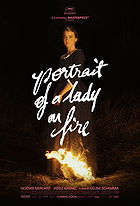 Posted : 4 years, 11 months ago on 14 June 2020 07:40
(A review of Portrait of a Lady on Fire)
Posted : 4 years, 11 months ago on 14 June 2020 07:40
(A review of Portrait of a Lady on Fire)Céline Sciamma reveals the full scope of her talent with her fourth feature film, "Portrait of a Lady on Fire". Applying the feminist preoccupations and gender fluidity of her previous work to this eminently lavish and soul-stirring period piece, Sciamma expands on the ideology present in her repertoire, thus asserting her status as a feminist auteur, modulating and unerringly capturing the viewpoint of constricted women in a patriarchal world without ever requiring a male beyond the edge of the frame. Women take centre stage here, and the effect is as revelatory, passionate and expressive as you would expect. Lucidly summoning up the past, in this case the 18th century, one enters a claustrophobic microcosm and quickly becomes swept up in the intensity, isolation and intimacy of it all. Simmering and slow-burning, "Portrait of a Lady on Fire" delivers a breathtakingly beautiful backdrop for its abundantly layered story, abounding with allusions, themes, references and details, concerning the forbidden love affair between a female painter tasked with painting, mainly from memory, a wedding portrait of a reluctant young bride without her consent. Owing to the gender inequality and social impediments of the era, it is unfeasible that the painter's love for her betrothed subject will materialise into anything beyond a series of encounters; the measured journey towards their brief connection proves more enchanting and rewarding than any far-fetched happy ending. Sciamma deftly subverts the male gaze theory by tempering the minimal exposition process of the leisurely paced, exceptionally lean narrative with attentively designed visions of the conflicted painter's experience. Exiguous with levels of complex, lovingly crafted, executed and performed cinematic art transcending time and place, "Portrait of a Lady on Fire" gives power to the powerless and is all the more astonishing a feat, succeeding where so many precursory films failed: a warranted, immersive experience entirely from a female perspective, ergo redeeming so many decades of the dominant male gaze in cinema.
 0 comments, Reply to this entry
0 comments, Reply to this entry
Seconds review
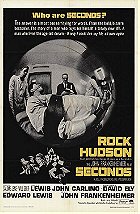 Posted : 4 years, 11 months ago on 13 June 2020 11:37
(A review of Seconds)
Posted : 4 years, 11 months ago on 13 June 2020 11:37
(A review of Seconds)Indubitably the most prophetic cinematic vision of John Frankenheimer's notable period as a Hollywood director, "Seconds" is the culmination of his preoccupation with contemporary thought and political situation. Disregarded at the time of its release in 1966, the film's formidable, unflinching exploration of the murky, salacious recesses of the swinging sixties, psychedelia subculture and wish fulfilment was perhaps too vicious and scathing in its attack. Subversive and single-minded in its pessimistic view of the 1960s, "Seconds" takes aim at McCarthyism, industrial and military expansion, but most of all, technological advancement in all its uncontrollable superiority and underestimated immensity. Such explicit conspiratorial and science fiction elements take centre stage as the plot progresses; a middle-aged, dissatisfied executive is contacted by a supposedly dead friend who urges him to visit a shady organisation offering him a new life. Upon being surgically transformed into a younger, handsome Malibu painter, whose name was taken from a recently deceased man, a bogus death is arranged for his own identity and he enters a community of others who have been persuaded to acquire the Company's shrouded and furtive services.
"Seconds" surveys the folly of man, as well as rejection of conformity, desertion of personal responsibility and defiance of conventionality. Frankenheimer presents the audience with the disastrous repercussions of aforesaid imprudence if one is given the opportunity to contravene unwritten protocols and simply alter our defined physical appearance to somehow experience a much improved perspective of life with possibly different outcomes. In jettisoning the past and thoughtlessly seeking out new horizons, the Kafkaesque nightmare at the film's core unveils the perils of augmentation and altered consciousness; positing autonomy over one's life and body is ill-advised, a frightening prospect that should serve you well in the event of undergoing any procedure, cosmetic or otherwise. Enhanced by distorted, off-kilter imagery, sociopolitical themes and underscored by a chilling ambience, Frankenheimer's capturing of the zeitgeist here is unlike any other film showcasing the paranoiac sensibilities of the time, critical of capitalism and the pervading belief that success is the zenith of life, and the terrifying truth that big business will provide anything if there is enough demand for it. "Seconds" is deeply affecting whilst being starkly portentous of escapism and incriminating of certain aspects of the American dream, and ergo, it is more than simply the concluding part of Frankenheimer's politically astute thrillers, otherwise known as the paranoiac trilogy. It is his masterpiece, a scornful, shattering and shockingly prescient portrayal of vitality and application of knowledge being at the forefront of society's obsession with gratification, reward and consumerism, which in turn leads to manipulation bordering on a Faustian pact without the surety of pleasure. Fundamental to the pervasive, foreboding atmosphere, and palpable in every shot, is James Wong Howe's photography, which inculcates the improbabilities of the story by constructing a dream-like sense of topsy-turvy confusion and distress, thus aiding the flow and suspense of the narrative. Frankenheimer's marked intelligence lends the film an air of sophistication and earnestness within its science fiction bent, stylistic flourishes and polemic opinions. As disorienting as the visuals and thematics are, the cinematic features of the film are on par with its breadth of ideas, maximising and accenting the modern Prometheus concept with underlying assaults on capitalism, consumerism and industrialisation. "Seconds" ponders the notion of beauty, art and sex being more appealing than tangible success, as well as the possibility that humanity is as much a commodity as any other item. Frankenheimer's most haunting, fully realised work takes a decidedly dim view of post-war America and the modern age of superficiality, personnel, commerce and commodification, but in a callous world in which bodies are utilised and the soul is not resurrected as part of a second life, it becomes clear that this terrible process is not without unpleasant side effects and catastrophic consequences, and therein lies the film's greatest achievement: its intricately woven threads of possibility and allusions to reality. Angst-ridden, grim and moody, "Seconds" succeeds in adding weight and credibility to its seemingly surreal premise. Frankenheimer's deft direction and Wong Howe's caliginous aesthetic combine to create ironies, metaphors and motifs, securing the film's status as a fervent, socially conscious thriller yet to be matched in terms of momentum, intensity, plausibility, and the brutal, lasting power of its desolating and utterly unsparing final scene.
"Seconds" surveys the folly of man, as well as rejection of conformity, desertion of personal responsibility and defiance of conventionality. Frankenheimer presents the audience with the disastrous repercussions of aforesaid imprudence if one is given the opportunity to contravene unwritten protocols and simply alter our defined physical appearance to somehow experience a much improved perspective of life with possibly different outcomes. In jettisoning the past and thoughtlessly seeking out new horizons, the Kafkaesque nightmare at the film's core unveils the perils of augmentation and altered consciousness; positing autonomy over one's life and body is ill-advised, a frightening prospect that should serve you well in the event of undergoing any procedure, cosmetic or otherwise. Enhanced by distorted, off-kilter imagery, sociopolitical themes and underscored by a chilling ambience, Frankenheimer's capturing of the zeitgeist here is unlike any other film showcasing the paranoiac sensibilities of the time, critical of capitalism and the pervading belief that success is the zenith of life, and the terrifying truth that big business will provide anything if there is enough demand for it. "Seconds" is deeply affecting whilst being starkly portentous of escapism and incriminating of certain aspects of the American dream, and ergo, it is more than simply the concluding part of Frankenheimer's politically astute thrillers, otherwise known as the paranoiac trilogy. It is his masterpiece, a scornful, shattering and shockingly prescient portrayal of vitality and application of knowledge being at the forefront of society's obsession with gratification, reward and consumerism, which in turn leads to manipulation bordering on a Faustian pact without the surety of pleasure. Fundamental to the pervasive, foreboding atmosphere, and palpable in every shot, is James Wong Howe's photography, which inculcates the improbabilities of the story by constructing a dream-like sense of topsy-turvy confusion and distress, thus aiding the flow and suspense of the narrative. Frankenheimer's marked intelligence lends the film an air of sophistication and earnestness within its science fiction bent, stylistic flourishes and polemic opinions. As disorienting as the visuals and thematics are, the cinematic features of the film are on par with its breadth of ideas, maximising and accenting the modern Prometheus concept with underlying assaults on capitalism, consumerism and industrialisation. "Seconds" ponders the notion of beauty, art and sex being more appealing than tangible success, as well as the possibility that humanity is as much a commodity as any other item. Frankenheimer's most haunting, fully realised work takes a decidedly dim view of post-war America and the modern age of superficiality, personnel, commerce and commodification, but in a callous world in which bodies are utilised and the soul is not resurrected as part of a second life, it becomes clear that this terrible process is not without unpleasant side effects and catastrophic consequences, and therein lies the film's greatest achievement: its intricately woven threads of possibility and allusions to reality. Angst-ridden, grim and moody, "Seconds" succeeds in adding weight and credibility to its seemingly surreal premise. Frankenheimer's deft direction and Wong Howe's caliginous aesthetic combine to create ironies, metaphors and motifs, securing the film's status as a fervent, socially conscious thriller yet to be matched in terms of momentum, intensity, plausibility, and the brutal, lasting power of its desolating and utterly unsparing final scene.
 0 comments, Reply to this entry
0 comments, Reply to this entry
Romeo + Juliet (1996) review
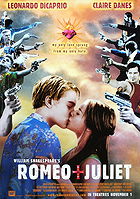 Posted : 4 years, 12 months ago on 10 June 2020 05:36
(A review of Romeo + Juliet (1996))
Posted : 4 years, 12 months ago on 10 June 2020 05:36
(A review of Romeo + Juliet (1996))Authentically anchored by retaining Shakespeare's text, even inserting and reciprocating popular songs, high tragedy and comedy as per the source play, Baz Luhrmann's relentlessly paced adaptation, retitled as "Romeo + Juliet", nevertheless dispenses with wearisome, derivative reverence to the 1968 film version and opts for total modification, transposing the action to the present day, reimagining contemporary Venice as Verona Beach, home to pistol-wielding gang warfare, fast cars and network news.
Despite breaking with convention in several ways in terms of faithfulness to the story and polarising many critics on the basis of its visual flourishes and questionable casting choices, mass appeal was achieved through the exceptional performances of two young unknowns and established screen veterans, all of whom painstakingly deliver their lines with genuine conviction and earnestness. Luhrmann's decadent, visually innovative modernisation was calculatedly aimed at holding the attention of the spasmodic, easily bored MTV generation, thus facilitating the accessibility of the play for younger viewers wholly unfamiliar with the Bard's classic tragedy. What resulted was a fresh revision, a dazzlingly cinematic and hyperkinetic tour de force that remains volatile, romantic and immersive, functioning not only as flashy, unbridled entertainment, but also as a delightfully irreverent, edgy introduction to Shakespeare for the neophyte.
Despite breaking with convention in several ways in terms of faithfulness to the story and polarising many critics on the basis of its visual flourishes and questionable casting choices, mass appeal was achieved through the exceptional performances of two young unknowns and established screen veterans, all of whom painstakingly deliver their lines with genuine conviction and earnestness. Luhrmann's decadent, visually innovative modernisation was calculatedly aimed at holding the attention of the spasmodic, easily bored MTV generation, thus facilitating the accessibility of the play for younger viewers wholly unfamiliar with the Bard's classic tragedy. What resulted was a fresh revision, a dazzlingly cinematic and hyperkinetic tour de force that remains volatile, romantic and immersive, functioning not only as flashy, unbridled entertainment, but also as a delightfully irreverent, edgy introduction to Shakespeare for the neophyte.
 0 comments, Reply to this entry
0 comments, Reply to this entry
The Vanishing review
 Posted : 5 years ago on 22 May 2020 09:59
(A review of The Vanishing)
Posted : 5 years ago on 22 May 2020 09:59
(A review of The Vanishing)Logic and lucidity propel the action from the outset of George Sluizer's Dutch thriller, as two lovers share loaded exchanges and portents on their road trip to France. Such deep significance and euphemism may seem innocuous at first, but once the titular vanishing occurs, the story shifts into atypical territory and every spoken word or gesture becomes relevant to the plot mechanics and methodical visual blueprint. Even though the two characters we invest in effectively end up as plot devices, the tenuous nature and essence of their implied relationship as soulmates, even if as characters they are only thinly drawn, generates a prevailing emotional weight as we grasp the finer points of the film. It is the affecting love story between them that extricates the film from the detached heartlessness of most generic potboilers. Sluizer consistently defies and challenges audience expectations, and as such creates the sense of unease and dread pervading throughout. By channelling universal fears of abandonment and loneliness, not least the concept of destiny, the pivotal moment the couple are torn apart by tragedy is devastating to watch, Sluizer plunges us into a nightmarish mistral: the depraved notion of a man struck by the urge to commit an act of extreme evil without experiencing remorse.
Adhering to a dissentient, iconoclastic narrative form punctuated by didactic scenes contravenes every code of the mystery genre, "The Vanishing" revels in such irregular structuring yet still retains the power to frighten. Upon registering that the film is plot-driven rather than interested in character development, which only serves to render the disappearance at the centre of the story infinitely more mesmeric once we learn the truth behind it. As the story veers between the past to the present, suspense is built from awareness and insight into the motivations of a sociopath. At its core, the film is not vying for justice or resolution; the missing woman is not our focus. As the identity of the perpetrator and his evolving methodology in the lead up to her disappearance are divulged fairly early on, our attention transfers to him and we come to be transfixed by his precise planning and motivations. It is within this hastened unmasking that the film finds its milieu, indicating Sluizer's lack of concern with formulaic chronicling of events and refusing to pander to the universal cinematic desire for piecemeal tantalisation and eventual resoluteness.
In cataloguing the mundane, exacting rationales and family man respectability of the abductor, his diabolic mindset and mild-mannered, cold demeanour resonates with the film's discordant tone, as well as its incongruities, dichotomies and sinister off-beat moments, all born from modest beginnings. A superbly realised, precise exemplification of psychological terror, "The Vanishing" takes a fascinating non-linear, technical approach in depicting the banality of evil. Ostensibly an unsettling exploration of the twisted characteristics of its villain, whose savage pathology leads to a breathless climax involving his victim's desperate, increasingly unhinged boyfriend three years after the kidnap occurs, the film also clinically examines the risks of capitulation, certainty and morbid curiosity. Deftly executed, haunting and cerebral with a spooky, unvarnished quality, Sluizer's spine-tingling chiller relies on the ordinariness, subtleties and sinister atmosphere found in true crime to achieve its desired effect: to scare the wits out of you without ever resorting to gratuitous gore.
Adhering to a dissentient, iconoclastic narrative form punctuated by didactic scenes contravenes every code of the mystery genre, "The Vanishing" revels in such irregular structuring yet still retains the power to frighten. Upon registering that the film is plot-driven rather than interested in character development, which only serves to render the disappearance at the centre of the story infinitely more mesmeric once we learn the truth behind it. As the story veers between the past to the present, suspense is built from awareness and insight into the motivations of a sociopath. At its core, the film is not vying for justice or resolution; the missing woman is not our focus. As the identity of the perpetrator and his evolving methodology in the lead up to her disappearance are divulged fairly early on, our attention transfers to him and we come to be transfixed by his precise planning and motivations. It is within this hastened unmasking that the film finds its milieu, indicating Sluizer's lack of concern with formulaic chronicling of events and refusing to pander to the universal cinematic desire for piecemeal tantalisation and eventual resoluteness.
In cataloguing the mundane, exacting rationales and family man respectability of the abductor, his diabolic mindset and mild-mannered, cold demeanour resonates with the film's discordant tone, as well as its incongruities, dichotomies and sinister off-beat moments, all born from modest beginnings. A superbly realised, precise exemplification of psychological terror, "The Vanishing" takes a fascinating non-linear, technical approach in depicting the banality of evil. Ostensibly an unsettling exploration of the twisted characteristics of its villain, whose savage pathology leads to a breathless climax involving his victim's desperate, increasingly unhinged boyfriend three years after the kidnap occurs, the film also clinically examines the risks of capitulation, certainty and morbid curiosity. Deftly executed, haunting and cerebral with a spooky, unvarnished quality, Sluizer's spine-tingling chiller relies on the ordinariness, subtleties and sinister atmosphere found in true crime to achieve its desired effect: to scare the wits out of you without ever resorting to gratuitous gore.
 0 comments, Reply to this entry
0 comments, Reply to this entry
La Haine review
 Posted : 5 years ago on 16 May 2020 11:25
(A review of La Haine)
Posted : 5 years ago on 16 May 2020 11:25
(A review of La Haine)Veracious, insightful and nuanced despite its unflinching socioeconomic themes and anti-police stance, "La Haine" is world cinema at its most accessible and felicitous. Transpiring in the aftermath of an urban riot in the suburbs of Paris, the film surveys a day in the lives of three disenfranchised, multicultural men involved in said violent disturbance. Resplendent with technical flourishes, entirely apropos black-and-white cinematography, American influences and references, perhaps employed to enhance the universal comprehensibility and commercial viability of the film. Entirely self-aware and receptive to its audience on a greater scale than most low-budget, thinly-plotted and fast-paced ghetto pics of its ilk, the film nevertheless retains a hard-hitting rawness and a detached, simplistic feel that builds tension and simmers its contextual complexity, litigating its overriding message until the explosive final scene reinforces it. Somewhat violating cinematic and narrative rules, Mathieu Kassovitz's gritty, stylish cinema du look visual document on class and race evaluates and extricates the minutiae and causality of inner city life, unveiling the far-reaching repercussions of hatred within a vitriolic, disruptive criminal environment. It is a controversial piece of taut, powerful modern French cinema that every self-professed film aficionado should experience at least once.
 0 comments, Reply to this entry
0 comments, Reply to this entry
Beauty and the Beast review
 Posted : 5 years, 1 month ago on 29 April 2020 08:22
(A review of Beauty and the Beast)
Posted : 5 years, 1 month ago on 29 April 2020 08:22
(A review of Beauty and the Beast)Disney's thirtieth animated outing stands apart from its closest predecessors due to its deviation from the norm by introducing novel ideas into an anterior fairy tale, most notably feminism and toxic masculinity. Satisfyingly traditional and in tune with the sensibilities of the time, its stunning visuals, beautiful soundtrack, fluent pacing and romanticism recall a bygone era in which motion pictures were developed with the audience in mind whilst existing in the moral vacuum, reflecting our deepest fears and desires.
"Beauty and the Beast" serves as an exemplar that love can be transformative and beauty is not external, a lesson that broke new ground for Disney and its archaic treatment of their female characters; herein, the obligatory Princess is a bookworm discontented with her provincial life who then finds acceptance, adoration and respect from a Prince cursed with the body of a Beast. For the first time in Disney's history, the saviour roles are reversed in terms of gender and the stock love interest is recognised for what he is: a vainglorious, misogynistic throwback. Beastly as he is, we fall in love with what lies beneath the monstrous visage and temperament of the titular hero, although once he returns to his human form, the aforementioned spell is broken in more ways than one. Will the Prince value his Princess and still be true to her now that he is a fallible, lovable human again? Was the Beast perfect as he was? This lingering ambiguity is one of the many reasons why this is one of the greatest Disney adaptations, a magical fable that possesses universal appeal, modern touches, and lean, simplistic storytelling. It remains eminently entertaining and evocative, a true gem of modern animation that revived the fortunes of an outdated film company stuck in a formulaic rut and paved the way for its future dominance in the cinematic realm.
"Beauty and the Beast" serves as an exemplar that love can be transformative and beauty is not external, a lesson that broke new ground for Disney and its archaic treatment of their female characters; herein, the obligatory Princess is a bookworm discontented with her provincial life who then finds acceptance, adoration and respect from a Prince cursed with the body of a Beast. For the first time in Disney's history, the saviour roles are reversed in terms of gender and the stock love interest is recognised for what he is: a vainglorious, misogynistic throwback. Beastly as he is, we fall in love with what lies beneath the monstrous visage and temperament of the titular hero, although once he returns to his human form, the aforementioned spell is broken in more ways than one. Will the Prince value his Princess and still be true to her now that he is a fallible, lovable human again? Was the Beast perfect as he was? This lingering ambiguity is one of the many reasons why this is one of the greatest Disney adaptations, a magical fable that possesses universal appeal, modern touches, and lean, simplistic storytelling. It remains eminently entertaining and evocative, a true gem of modern animation that revived the fortunes of an outdated film company stuck in a formulaic rut and paved the way for its future dominance in the cinematic realm.
 0 comments, Reply to this entry
0 comments, Reply to this entry
Paprika review
 Posted : 5 years, 1 month ago on 24 April 2020 10:37
(A review of Paprika)
Posted : 5 years, 1 month ago on 24 April 2020 10:37
(A review of Paprika)The dream sequences are its saving grace, but this is by no means the masterpiece that I was expecting on the basis of its sterling reputation. It has glaring faults, namely undeveloped characterisation and a forceless narrative structure, both of which prevent the viewer from investing in beyond the superficial aspects. "Paprika" definitely succeeds from a visual viewpoint, but its construal elements fall flat. Perhaps the inclination to slickly actualise the complexity of dreamscapes without sacrificing logic was lost on its director, who opted to simplify the plot, thereby greatly reducing its potential to soar. Rather than applying surrealism to the sequence of events on screen and allowing the delineate components to be absorbed subliminally, the overt elucidation and predictable expounding compartmentalises the film for a vacuous Western audience, somewhat trivialising its characters as redundant, only necessary in terms of the progression of the meandering storyline. In this respect, I would have preferred an engineered non-linear impression with a modicum of exposition, but despite its impediments, the film is an immersive mind-trip akin to no other, beautifully animated and augmented by a zippy score and vivid imagery, which more than compensates for its weaknesses.
 0 comments, Reply to this entry
0 comments, Reply to this entry
 Login
Login
 Home
Home 4 Lists
4 Lists 55 Reviews
55 Reviews Collections
Collections